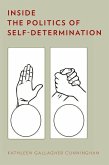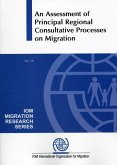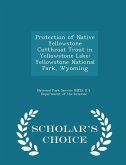Doing Research as a Native
A Guide for Fieldwork in Illiberal and Repressive States
Herausgeber: Jumet, Kira D; Mekouar, Merouan
Doing Research as a Native
A Guide for Fieldwork in Illiberal and Repressive States
Herausgeber: Jumet, Kira D; Mekouar, Merouan
- Broschiertes Buch
- Merkliste
- Auf die Merkliste
- Bewerten Bewerten
- Teilen
- Produkt teilen
- Produkterinnerung
- Produkterinnerung
Doing Research as a Native examines the specific challenges faced by researchers conducting fieldwork in their native repressive and/or illiberal countries. It presents narratives from 19 scholars, representing 15 countries in Africa, Asia, the Caribbean, Eastern Europe, South America, Central Asia and South Asia, who conducted fieldwork in their native repressive and/or illiberal countries. These researchers encountered obstacles directly related to their native status, particularly with regard to their gender, race and ethnicity. This volume also provides practical guidance on how to address these challenges.…mehr
Andere Kunden interessierten sich auch für
![Inside the Politics of Self-Determination Inside the Politics of Self-Determination]() Kathleen Gallagher CunninghamInside the Politics of Self-Determination50,99 €
Kathleen Gallagher CunninghamInside the Politics of Self-Determination50,99 €![Making the World Safe for Dictatorship Making the World Safe for Dictatorship]() Alexander DukalskisMaking the World Safe for Dictatorship35,99 €
Alexander DukalskisMaking the World Safe for Dictatorship35,99 €![The Marshall Decision and Native Rights The Marshall Decision and Native Rights]() Ken CoatesThe Marshall Decision and Native Rights43,99 €
Ken CoatesThe Marshall Decision and Native Rights43,99 €![An ACT to Amend the Alaska Native Claims Settlement ACT to Make Certain Clarifications to the Land Bank Protection Provisions, and for Other Purposes. - Scholar's Choice Edition An ACT to Amend the Alaska Native Claims Settlement ACT to Make Certain Clarifications to the Land Bank Protection Provisions, and for Other Purposes. - Scholar's Choice Edition]() An ACT to Amend the Alaska Native Claims Settlement ACT to Make Certain Clarifications to the Land Bank Protection Provisions, and for Other Purposes. - Scholar's Choice Edition17,99 €
An ACT to Amend the Alaska Native Claims Settlement ACT to Make Certain Clarifications to the Land Bank Protection Provisions, and for Other Purposes. - Scholar's Choice Edition17,99 €![Drinking Water Infrastructure Needs Survey American Indian and Alaska Native Village Water Systems Survey - Scholar's Choice Edition Drinking Water Infrastructure Needs Survey American Indian and Alaska Native Village Water Systems Survey - Scholar's Choice Edition]() Drinking Water Infrastructure Needs Survey American Indian and Alaska Native Village Water Systems Survey - Scholar's Choice Edition19,99 €
Drinking Water Infrastructure Needs Survey American Indian and Alaska Native Village Water Systems Survey - Scholar's Choice Edition19,99 €![An Assessment of Principal Consultative Processes on Migration An Assessment of Principal Consultative Processes on Migration]() An Assessment of Principal Consultative Processes on Migration19,99 €
An Assessment of Principal Consultative Processes on Migration19,99 €![Protection of Native Yellowstone Cutthroat Trout in Yellowstone Lake Protection of Native Yellowstone Cutthroat Trout in Yellowstone Lake]() Protection of Native Yellowstone Cutthroat Trout in Yellowstone Lake17,99 €
Protection of Native Yellowstone Cutthroat Trout in Yellowstone Lake17,99 €-
-
-
Doing Research as a Native examines the specific challenges faced by researchers conducting fieldwork in their native repressive and/or illiberal countries. It presents narratives from 19 scholars, representing 15 countries in Africa, Asia, the Caribbean, Eastern Europe, South America, Central Asia and South Asia, who conducted fieldwork in their native repressive and/or illiberal countries. These researchers encountered obstacles directly related to their native status, particularly with regard to their gender, race and ethnicity. This volume also provides practical guidance on how to address these challenges.
Hinweis: Dieser Artikel kann nur an eine deutsche Lieferadresse ausgeliefert werden.
Hinweis: Dieser Artikel kann nur an eine deutsche Lieferadresse ausgeliefert werden.
Produktdetails
- Produktdetails
- Verlag: Oxford University Press
- Seitenzahl: 360
- Erscheinungstermin: 17. Januar 2025
- Englisch
- Abmessung: 226mm x 150mm x 18mm
- Gewicht: 522g
- ISBN-13: 9780197699812
- ISBN-10: 0197699812
- Artikelnr.: 72794513
- Herstellerkennzeichnung
- Libri GmbH
- Europaallee 1
- 36244 Bad Hersfeld
- gpsr@libri.de
- Verlag: Oxford University Press
- Seitenzahl: 360
- Erscheinungstermin: 17. Januar 2025
- Englisch
- Abmessung: 226mm x 150mm x 18mm
- Gewicht: 522g
- ISBN-13: 9780197699812
- ISBN-10: 0197699812
- Artikelnr.: 72794513
- Herstellerkennzeichnung
- Libri GmbH
- Europaallee 1
- 36244 Bad Hersfeld
- gpsr@libri.de
Kira D. Jumet is Associate Professor of Government and Director of the Middle East/Islamicate Worlds Studies Program at Hamilton College. Her research focuses on social movements, authoritarianism, and national identity in the Middle East and North Africa. With an academic backround in Political Science and Middle East Studies, Jumet takes an interdisciplinary approach to her scholarship. She is the author of Contesting the Repressive State: Why Ordinary Egyptians Protested During the Arab Spring (2018) and has also published on violent Islamism and repression in Egypt. Jumet has conducted fieldwork in Morocco for her current work on nation-building in the country. Merouan Mekouar is Associate Professor of Social Science at York University and specializes in norm diffusion, social movements, and authoritarian practices in North Africa and the Middle East. Originally trained in political science, Mekouar draws upon a wide range of disciplines--including comparative politics, international relations, political sociology, development studies, and behavioral economics--to examine diverse political phenomena ranging from the emergence and adoption of new authoritarian practices and means of contention to regime learning and stress contamination in security organizations. In recent years, he has expanded his scholarship to include critical fieldwork methodologies in illiberal and authoritarian countries.
* Introduction
* Part 1: Gender and Societal Expectations
* Chapter 1: "But Where Is Your Grandmother Really From?" Negotiating
Ethnicity, Gender, and Belonging After War (Bosnia and Herzegovina
and Serbia)
* Chapter 2: Discomfort in the Field: Navigating Family Politics, the
Streets, and the State in Algeria (Algeria)
* Chapter 3: Doing Research on the "Margins": Fieldwork as a Pashtun in
Pakistan (Pakistan)
* Chapter 4: Suspicion, Surveillance, and Survival in Kashmir
(Indian-controlled Kashmir)
* Chapter 5: Gender and Societal Expectations: A Provisional Guide
* Part 2: Race, Ethnicity, and Belonging
* Chapter 6: Ethnicity as a Liability: Fieldwork as a Mixed Ethnic
Researcher in Ethiopia (Ethiopia)
* Chapter 7: "Racial Democracy" as a Fallacy: Art, Research, and
Identity in Brazil (Brazil)
* Chapter 8: "Come Back as a Piece, not Pieces": Risks, Experiences,
and Practices of Researching "Sensitive" Topics in One's Home Country
- A Note from Northern Nigeria (Nigeria)
* Chapter 9: Guardians of the Archives: The Bishop and the Bureaucrat
in Socialist Cuba (Cuba)
* Chapter 10: Race, Ethnicity, and Belonging: A Provisional Guide
* Part 3: Legal Threats and Red Lines
* Chapter 11: Lacan in Vietnam: Managing Anxiety and Minimizing
Surveillance (Vietnam)
* Chapter 12: Nowhere to Hide: An Egyptian Researcher, Between Forced
Exile and Arrest (Egypt)
* Chapter 13: Walking a Fine Line: Institutional Ambiguities and
Ethical Dilemmas in Tajikistan (Tajikistan)
* Chapter 14: What Does One Do with the Nightmares? Are They
Ethnographic Data or Material for a Psychoanalyst? (Nicaragua)
* Chapter 15: Legal Threats and Red Lines: A Provisional Guide
* Part 4: Exploitation
* Chapter 16: Impossible Return? Vulnerability for Iranian
Dual-National Researchers in the Field (Iran)
* Chapter 17: Questionable Solicitations and Regime Restrictions:
Protecting Family, Colleagues, and Oneself while Researching in
Nicaragua (Nicaragua)
* Chapter 18: Navigating Dangerous Fields: Storytelling, Waiting, and
Ethnography without Fieldnotes (Turkey)
* Chapter 19: Exploitation: A Provisional Guide
* Conclusion
* Part 1: Gender and Societal Expectations
* Chapter 1: "But Where Is Your Grandmother Really From?" Negotiating
Ethnicity, Gender, and Belonging After War (Bosnia and Herzegovina
and Serbia)
* Chapter 2: Discomfort in the Field: Navigating Family Politics, the
Streets, and the State in Algeria (Algeria)
* Chapter 3: Doing Research on the "Margins": Fieldwork as a Pashtun in
Pakistan (Pakistan)
* Chapter 4: Suspicion, Surveillance, and Survival in Kashmir
(Indian-controlled Kashmir)
* Chapter 5: Gender and Societal Expectations: A Provisional Guide
* Part 2: Race, Ethnicity, and Belonging
* Chapter 6: Ethnicity as a Liability: Fieldwork as a Mixed Ethnic
Researcher in Ethiopia (Ethiopia)
* Chapter 7: "Racial Democracy" as a Fallacy: Art, Research, and
Identity in Brazil (Brazil)
* Chapter 8: "Come Back as a Piece, not Pieces": Risks, Experiences,
and Practices of Researching "Sensitive" Topics in One's Home Country
- A Note from Northern Nigeria (Nigeria)
* Chapter 9: Guardians of the Archives: The Bishop and the Bureaucrat
in Socialist Cuba (Cuba)
* Chapter 10: Race, Ethnicity, and Belonging: A Provisional Guide
* Part 3: Legal Threats and Red Lines
* Chapter 11: Lacan in Vietnam: Managing Anxiety and Minimizing
Surveillance (Vietnam)
* Chapter 12: Nowhere to Hide: An Egyptian Researcher, Between Forced
Exile and Arrest (Egypt)
* Chapter 13: Walking a Fine Line: Institutional Ambiguities and
Ethical Dilemmas in Tajikistan (Tajikistan)
* Chapter 14: What Does One Do with the Nightmares? Are They
Ethnographic Data or Material for a Psychoanalyst? (Nicaragua)
* Chapter 15: Legal Threats and Red Lines: A Provisional Guide
* Part 4: Exploitation
* Chapter 16: Impossible Return? Vulnerability for Iranian
Dual-National Researchers in the Field (Iran)
* Chapter 17: Questionable Solicitations and Regime Restrictions:
Protecting Family, Colleagues, and Oneself while Researching in
Nicaragua (Nicaragua)
* Chapter 18: Navigating Dangerous Fields: Storytelling, Waiting, and
Ethnography without Fieldnotes (Turkey)
* Chapter 19: Exploitation: A Provisional Guide
* Conclusion
* Introduction
* Part 1: Gender and Societal Expectations
* Chapter 1: "But Where Is Your Grandmother Really From?" Negotiating
Ethnicity, Gender, and Belonging After War (Bosnia and Herzegovina
and Serbia)
* Chapter 2: Discomfort in the Field: Navigating Family Politics, the
Streets, and the State in Algeria (Algeria)
* Chapter 3: Doing Research on the "Margins": Fieldwork as a Pashtun in
Pakistan (Pakistan)
* Chapter 4: Suspicion, Surveillance, and Survival in Kashmir
(Indian-controlled Kashmir)
* Chapter 5: Gender and Societal Expectations: A Provisional Guide
* Part 2: Race, Ethnicity, and Belonging
* Chapter 6: Ethnicity as a Liability: Fieldwork as a Mixed Ethnic
Researcher in Ethiopia (Ethiopia)
* Chapter 7: "Racial Democracy" as a Fallacy: Art, Research, and
Identity in Brazil (Brazil)
* Chapter 8: "Come Back as a Piece, not Pieces": Risks, Experiences,
and Practices of Researching "Sensitive" Topics in One's Home Country
- A Note from Northern Nigeria (Nigeria)
* Chapter 9: Guardians of the Archives: The Bishop and the Bureaucrat
in Socialist Cuba (Cuba)
* Chapter 10: Race, Ethnicity, and Belonging: A Provisional Guide
* Part 3: Legal Threats and Red Lines
* Chapter 11: Lacan in Vietnam: Managing Anxiety and Minimizing
Surveillance (Vietnam)
* Chapter 12: Nowhere to Hide: An Egyptian Researcher, Between Forced
Exile and Arrest (Egypt)
* Chapter 13: Walking a Fine Line: Institutional Ambiguities and
Ethical Dilemmas in Tajikistan (Tajikistan)
* Chapter 14: What Does One Do with the Nightmares? Are They
Ethnographic Data or Material for a Psychoanalyst? (Nicaragua)
* Chapter 15: Legal Threats and Red Lines: A Provisional Guide
* Part 4: Exploitation
* Chapter 16: Impossible Return? Vulnerability for Iranian
Dual-National Researchers in the Field (Iran)
* Chapter 17: Questionable Solicitations and Regime Restrictions:
Protecting Family, Colleagues, and Oneself while Researching in
Nicaragua (Nicaragua)
* Chapter 18: Navigating Dangerous Fields: Storytelling, Waiting, and
Ethnography without Fieldnotes (Turkey)
* Chapter 19: Exploitation: A Provisional Guide
* Conclusion
* Part 1: Gender and Societal Expectations
* Chapter 1: "But Where Is Your Grandmother Really From?" Negotiating
Ethnicity, Gender, and Belonging After War (Bosnia and Herzegovina
and Serbia)
* Chapter 2: Discomfort in the Field: Navigating Family Politics, the
Streets, and the State in Algeria (Algeria)
* Chapter 3: Doing Research on the "Margins": Fieldwork as a Pashtun in
Pakistan (Pakistan)
* Chapter 4: Suspicion, Surveillance, and Survival in Kashmir
(Indian-controlled Kashmir)
* Chapter 5: Gender and Societal Expectations: A Provisional Guide
* Part 2: Race, Ethnicity, and Belonging
* Chapter 6: Ethnicity as a Liability: Fieldwork as a Mixed Ethnic
Researcher in Ethiopia (Ethiopia)
* Chapter 7: "Racial Democracy" as a Fallacy: Art, Research, and
Identity in Brazil (Brazil)
* Chapter 8: "Come Back as a Piece, not Pieces": Risks, Experiences,
and Practices of Researching "Sensitive" Topics in One's Home Country
- A Note from Northern Nigeria (Nigeria)
* Chapter 9: Guardians of the Archives: The Bishop and the Bureaucrat
in Socialist Cuba (Cuba)
* Chapter 10: Race, Ethnicity, and Belonging: A Provisional Guide
* Part 3: Legal Threats and Red Lines
* Chapter 11: Lacan in Vietnam: Managing Anxiety and Minimizing
Surveillance (Vietnam)
* Chapter 12: Nowhere to Hide: An Egyptian Researcher, Between Forced
Exile and Arrest (Egypt)
* Chapter 13: Walking a Fine Line: Institutional Ambiguities and
Ethical Dilemmas in Tajikistan (Tajikistan)
* Chapter 14: What Does One Do with the Nightmares? Are They
Ethnographic Data or Material for a Psychoanalyst? (Nicaragua)
* Chapter 15: Legal Threats and Red Lines: A Provisional Guide
* Part 4: Exploitation
* Chapter 16: Impossible Return? Vulnerability for Iranian
Dual-National Researchers in the Field (Iran)
* Chapter 17: Questionable Solicitations and Regime Restrictions:
Protecting Family, Colleagues, and Oneself while Researching in
Nicaragua (Nicaragua)
* Chapter 18: Navigating Dangerous Fields: Storytelling, Waiting, and
Ethnography without Fieldnotes (Turkey)
* Chapter 19: Exploitation: A Provisional Guide
* Conclusion








